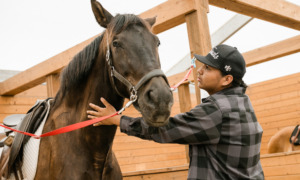Springfield, Mo.
(417) 887-4343
Objective: To provide employment, job training and social skills practice to poor teens who face barriers to employment or education, while they serve local youth who need help.
In a Nutshell: After extensive training to be certified as call operators, at-risk 16- to 21-year-olds are employed as peer counselors on a teen-to-teen help line called the Y-Line. Youth handle various types of phone calls from peers, ranging from calls about loneliness to sexual abuse and other types of violence. If a youth counselor needs help, the call is transferred to an adult youth worker on staff.
Where It Happens: The Y-Line is located at an undisclosed location in Springfield. Youth who work at the Y-Line are referred through Ozarks Area Community Action Corp. (OACAC) Youth Services, located at the Missouri Career Center in Springfield. This is also where youth attend GED classes and meet with their case managers.
When It Began: March 2001.
Who Started It: The concept was drawn up by Lisa Petachi, assistant director of youth services at OACAC.
Who Runs It: The Y-Line is run by OACAC Youth Services through a partnership with the Missouri Career Center, and is led by OACAC Youth Services Director Chuck Matthews. Dana Olmstead, a trained family and marriage counselor, supervises the Y-Line and the four youth operators. The line also uses local college students, who earn college credit for their work.
Early Obstacles: Much of the community was not aware of the Y-Line’s existence. Getting the name out to potential callers is still a challenge, Petachi says.
How They Overcame Them: They rely on extensive marketing in the community. Petachi and staff have promoted the phone line in schools and at Boys & Girls Clubs, and through radio and TV ads. Local Papa John’s and Domino’s pizza restaurants voluntarily attached Y-Line fliers to all of their delivery boxes for one week.
Cost: The Y-Line operates on a yearly budget of $47,884.The total wages for the youth phone operators – who earn $6.25 an hour – average about $80,000 a year. OACAC pays for the youth’s wages as well as for staff time for marketing and advertising.
Who Pays: OACAC Youth Services receives federal funding through the Workforce Investment Act (WIA), $87,500 of which is directed toward the hotline. Most other operating costs are paid for directly with a $58,000 renewable grant from the Missouri Department of Secondary and Elementary Education.
Who Else Has Kicked In: Local television and radio stations have helped stretch Y-Line’s advertising budget by providing lower rates and public service announcements. Warner Brothers Television matched Y-Line’s advertising dollars and provided about $20,000 to produce a 30-minute infomercial that airs every three months.
Youth Served: Youth counselors must be 16 to 21, in low-income families and face a “barrier to employment or education.” The original target group was juvenile offenders.
Youth Turn-On: “In working with at-risk youth, many times youth feel as if their life doesn’t matter and that they can’t make a difference in the world,” Petachi says. “This project gives them a chance to realize that what they have to say matters.” Youth operating the Y-Line are also paid for their time with WIA money.
Youth Turn-Off: There are slow periods when few calls come into the center. Although operators follow a curriculum during these times, the youth have a hard time dealing with down time.
Research Shows: The line is receiving more than 120 calls each month and operators have helped more than 1,400 local community youth. Six of the 10 youths who have worked at the Y-Line received their GED, and three have gone to college.
What Still Gets in the Way: The program’s state grant was renewed for next year, but Petachi continues to search for a corporate sponsor for the line. “We never know when the funding will expire,” she says.






























